Items
Subject is exactly
Politics
-
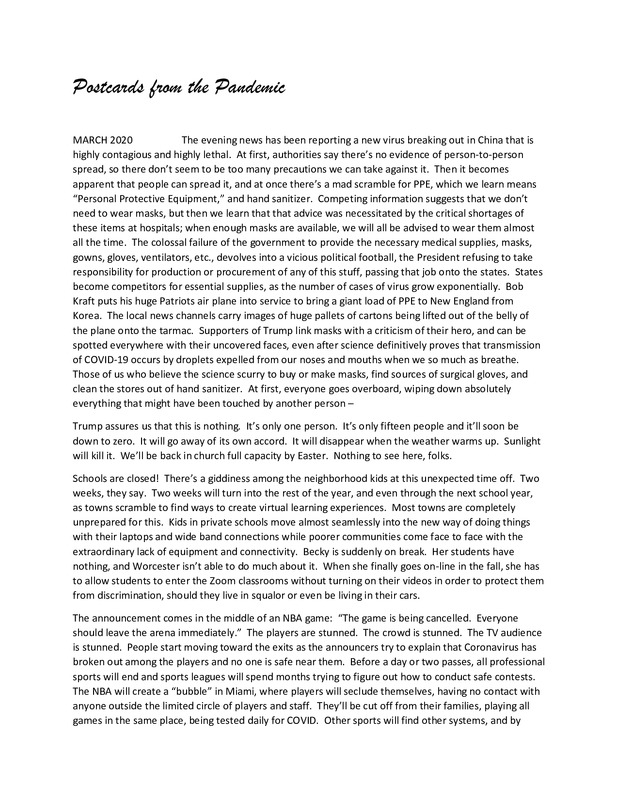 2020-03
2020-03Postcards From the Pandemic
I intended to record the lived experience of the COVID-19 pandemic through the mundane details of our coping strategies, set against larger, national events. -
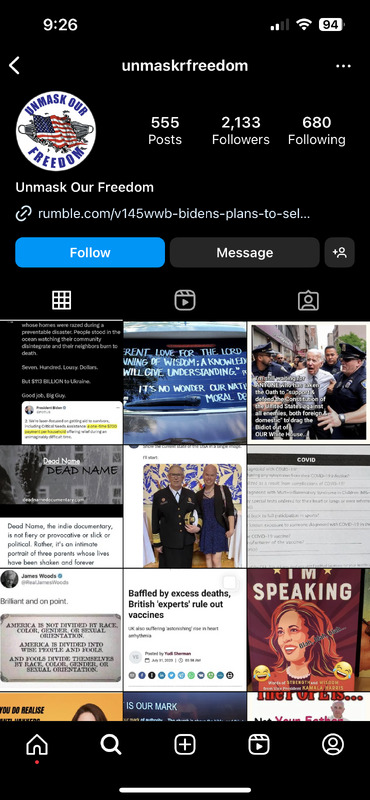 2023-08-30
2023-08-30COVID paranoia alive and well in 2023
At a stop light this morning, my attention was grabbed by a car with lots of writing on it. I wish I could have gotten a picture, but the light turned green before I could. The car message was about Marxism and how fear controls its movement. The message expressed that recent events have all been staged in order to control society and went on to predict that mask mandates would be back on September 15. The message ended by encouraging people to resist the future mandate in order to retain control of our society. I was very intrigued to see that there are some people who are still very vocal about topics such as this and very loudly are telling people not to live in fear when they are the only ones who seem to be living in fear these days. I read a hashtag on their car and looked it up when I got home. This page belongs to a person (or movement) that is very anti-mask, anti-covid vaccine, and anti-mandates. They are part of the extreme right politically and very religious. I’m curious to see if anything were to happen on the 15th and if not, how this page will respond to the “normality” of September 15. I guess we’ll see in two weeks. -
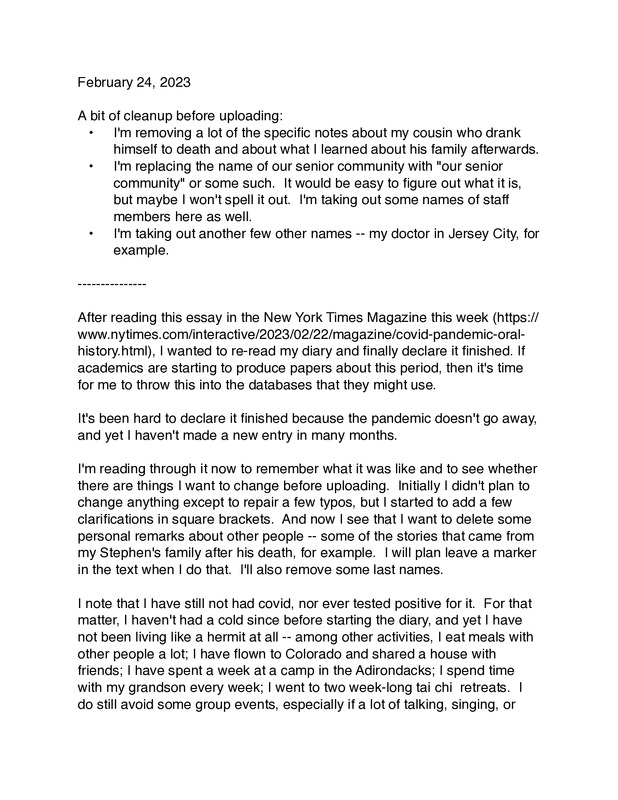 2020-02-25
2020-02-25Covid journal, 2020-2023
From the beginning, I was aware that this was a world historical event and I wanted to be very attentive to how it played out, both in the news and in my personal life. I read that diaries were scarce in the aftermath of the 1917 pandemic, so it could be useful to scholars to create one this time. I reviewed it before submission, and it reminded me of many things I had already forgotten. Once I started in February 2020, I wrote every day until mid-2021, when entries began to thin out. -
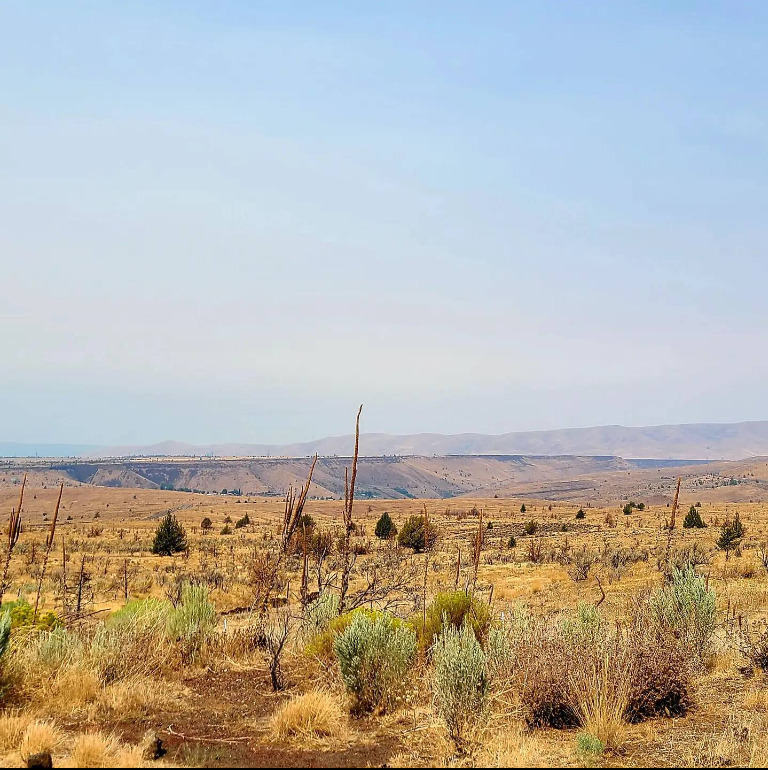 2021-08-15
2021-08-15Pandemics, Wildfires, and Climate Change
The Covid 19 Pandemic is and was a transformative event representing history in the making. The state of Oregon and particularly Portland witnessed a trifecta of converging crises beginning with the lockdown on St. Patrick’s Day in 2020. That summer was one of the hottest in recorded history and saw the city and state divided in smoke-filled chaos. The literal last words of “I can’t breathe” uttered by George Floyd were being chanted in the streets downtown as wildfires raged in all corners of the state, set against the backdrop of a global pandemic. Everything felt surreal and the tension in the city was like a powder keg. By the following summer some advancements had been made, the first round of vaccinations administered, but the same underlying issues were present in Portland. Houselessness, fractured political ideologies, and Far-Right and Far-Left members clashing in an invisible maelstrom on the Willamette River. My husband and I had adhered to the very stringent guidelines and protocol set by both the city and state to the letter. For a bit of context, my husband worked on the front line as a department manager at a grocery store and wore a mask for eleven hours at a time often six days a week for a year and a half, while I volunteered at the Red Cross and held down the home front. In August of 2021, we finally decided that we needed to get out of town, so we grabbed the dog and set a course for the Crooked River in Central Oregon. It was a two-week period of sheer peace and glory bookended by fear and anger at the negligence of fellow humans. We camped on the river and practiced mindfulness and being present every day, breathing deeply the fresh air ushered in by a strong breeze from the East. The “going there” and “going home” portions were marred by anti-mask protestors with weapons arguing about state’s rights, as death toll numbers were rising. The fires had already burned over a million acres with no signs of slowing down, and the reality of Portland’s social justice issues did not disappear just because we did. The experience left us feeling gratitude for the opportunity to explore, our good health, and open minds, it was our 18th wedding anniversary, in which porcelain is traditionally given as a gift. Ironic, given the fact that not only is porcelain extraordinarily beautiful but also incredibly delicate, a perfect representation of the state of things during the summer of 2021. -
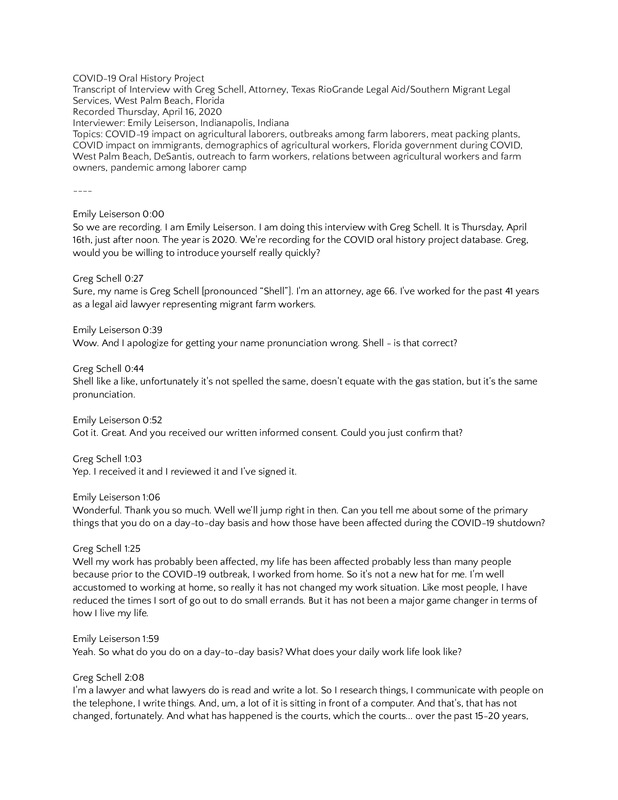 04/16/2020
04/16/2020Greg Schell Oral History, 2020/04/16
-
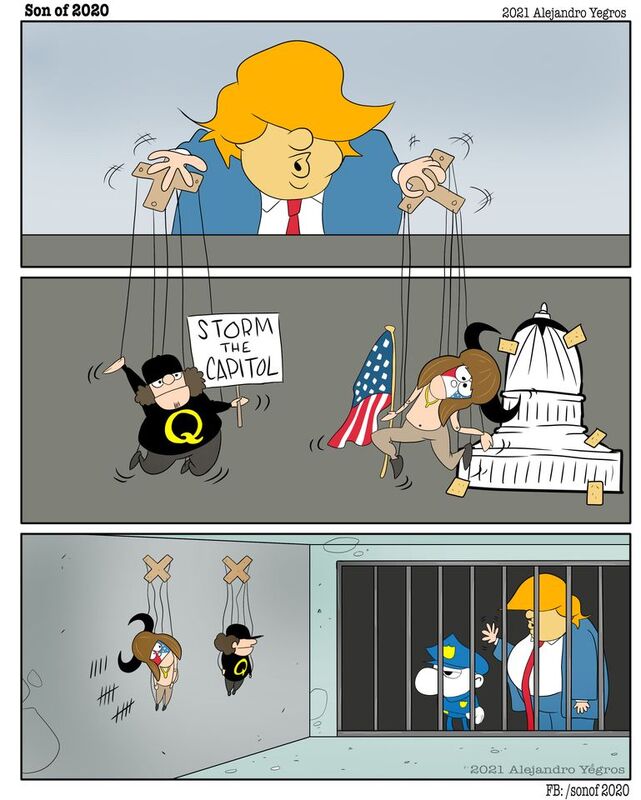 2021-01-15
2021-01-15Marionettes can't escape the long arm of the law.
a comic strip about Covid-19 -
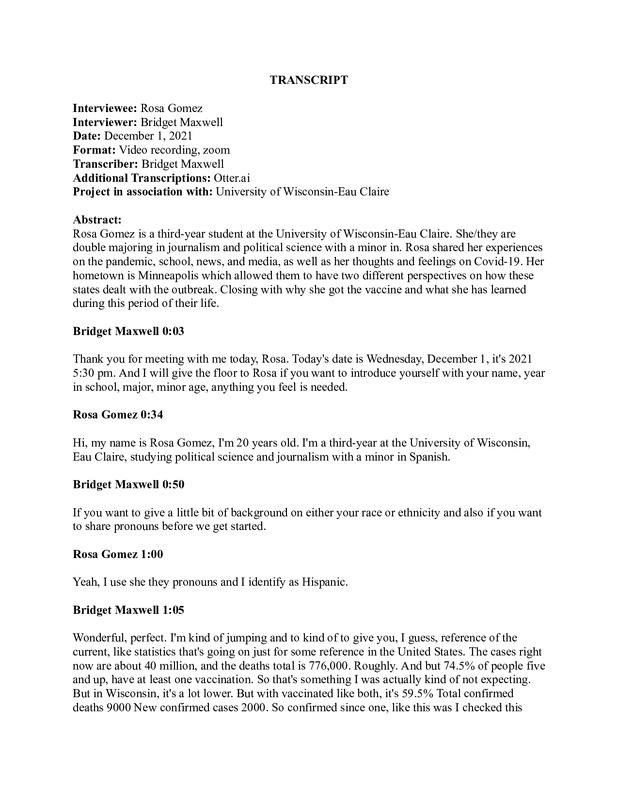 12/01/2021
12/01/2021Rosa Gomez Oral History, 2021/12/01
Rosa Gomez is a third-year student at the University of Wisconsin-Eau Claire. She/they are double majoring in journalism and political science with a minor in. Rosa shared her experiences on the pandemic, school, news, and media, as well as her thoughts and feelings on Covid-19. Her hometown is Minneapolis which allowed them to have two different perspectives on how these states dealt with the outbreak. Closing with why she got the vaccine and what she has learned during this period of their life. -
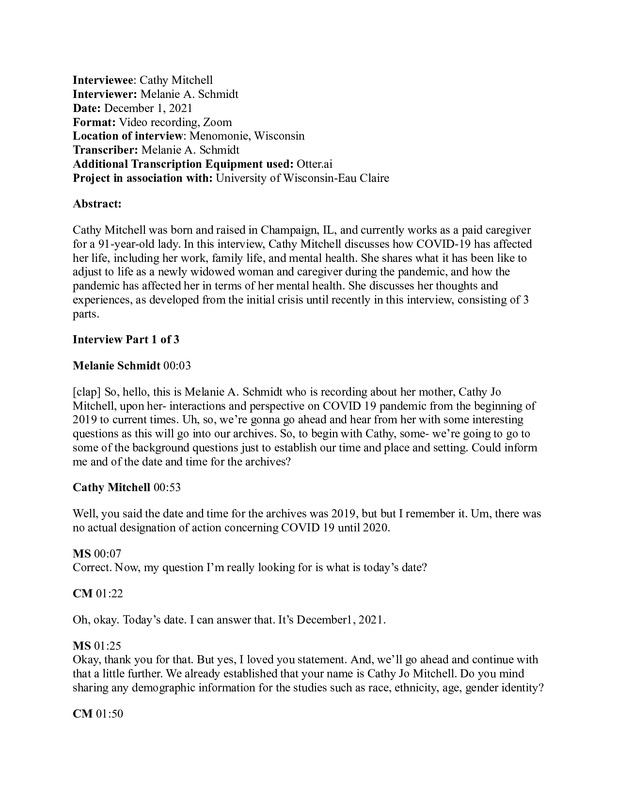 12/01/2021
12/01/2021Cathy Mitchell Oral History, 2021/12/01
Cathy Mitchell was born and raised in Champaign, IL, and currently works as a paid caregiver for a 91-year-old lady. In this interview, Cathy Mitchell discusses how COVID-19 has affected her life, including her work, family life, and mental health. She shares what it has been like to adjust to life as a newly widowed woman and caregiver during the pandemic, and how the pandemic has affected her in terms of her mental health. She discusses her thoughts and experiences, as developed from the initial crisis until recently in this interview, consisting of 3 parts. -
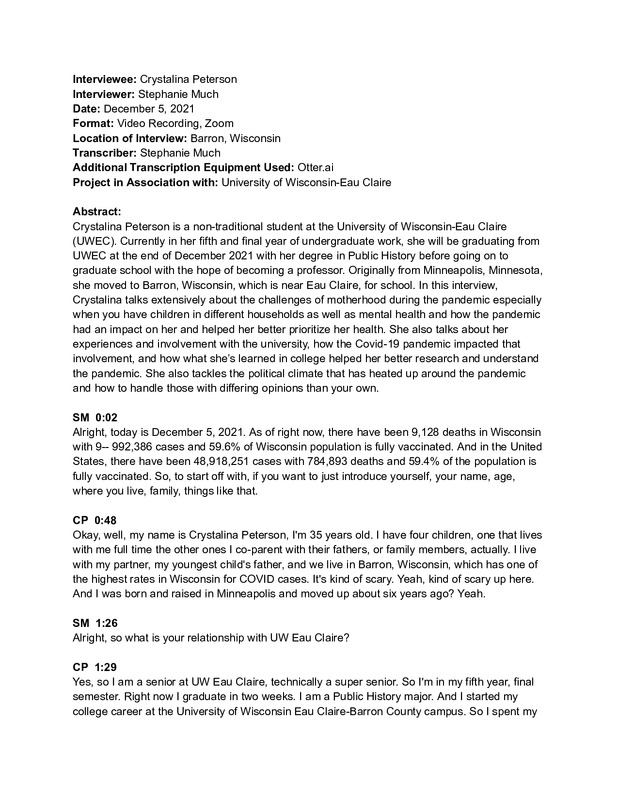 12/05/2021
12/05/2021Crystalina Peterson Oral History, 2021/12/05
Crystalina Peterson is a non-traditional University of Wisconsin-Eau Claire (UWEC) student. Currently, in her fifth and final year of undergraduate work, she will graduate from UWEC at the end of December 2021 with her degree in Public History before going on to graduate school with the hope of becoming a professor. Originally from Minneapolis, Minnesota, she moved to Barron, Wisconsin, near Eau Claire, for school. In this interview, Crystalina talks extensively about the challenges of motherhood during the pandemic especially when you have children in different households as well as mental health and how the pandemic had an impact on her and helped her better prioritize her health. She also talks about her experiences and involvement with the university, how the Covid-19 pandemic impacted that involvement, and how what she’s learned in college helped her better research and understand the pandemic. She also tackles the political climate that has heated up around the pandemic and how to handle those with differing opinions than your own. -
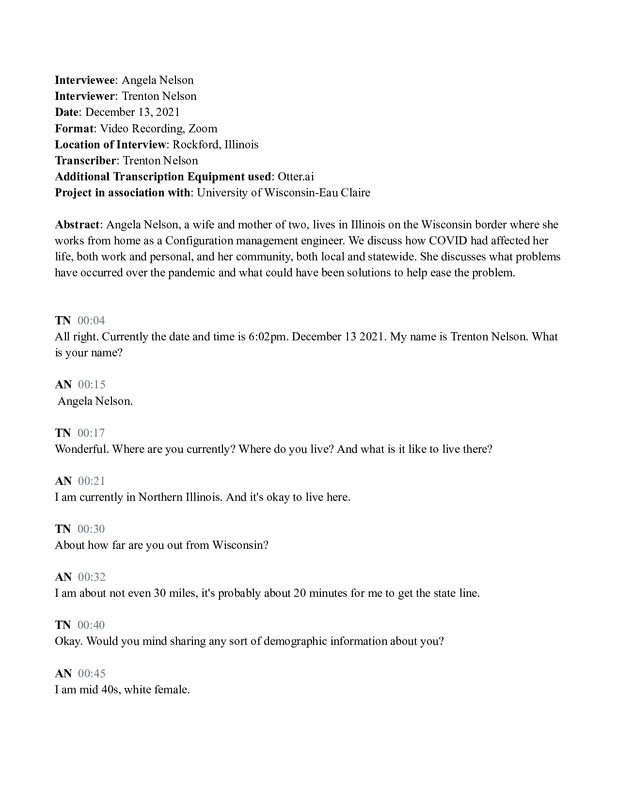 12/13/2021
12/13/2021Angela Nelson Oral History, 2021/12/13
Angela Nelson, a wife and mother of two, lives in Illinois on the Wisconsin border where she works from home as a Configuration management engineer. We discuss how COVID had affected her life, both work and personal, and her community, both local and statewide. She discusses what problems have occurred over the pandemic and what could have been solutions to help ease the problem. -
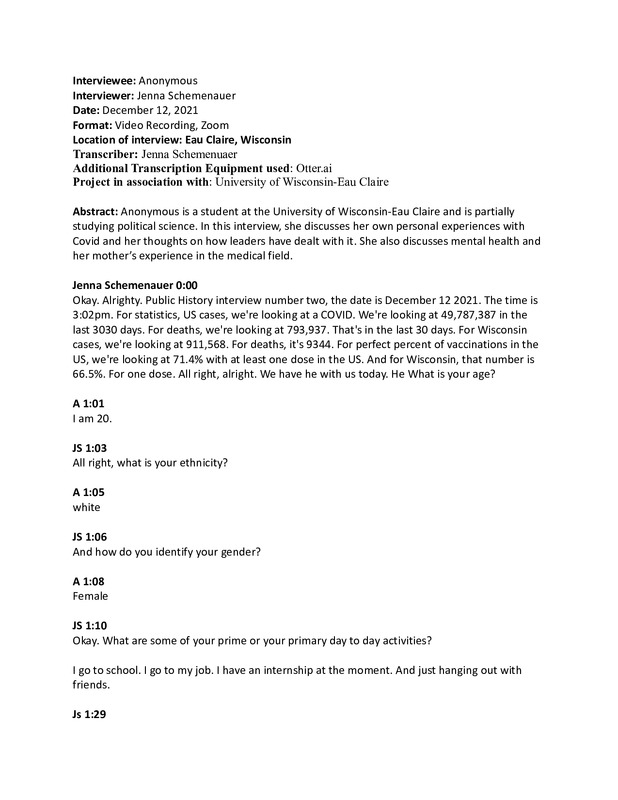 12/12/2021
12/12/2021Anonymous Oral History, 2021/12/12
Anonymous is a student at the University of Wisconsin-Eau Claire and is partially studying political science. In this interview, she discusses her own personal experiences with Covid and her thoughts on how leaders have dealt with it. She also discusses mental health and her mother’s experience in the medical field. -
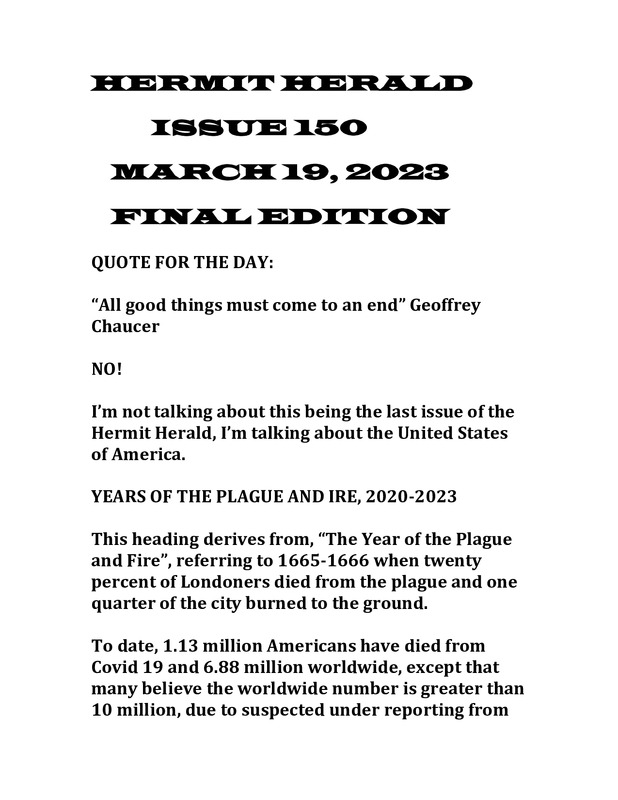 2023-03-19
2023-03-19HERMIT HERALD, ISSUE 150
Final issue, a three year review -
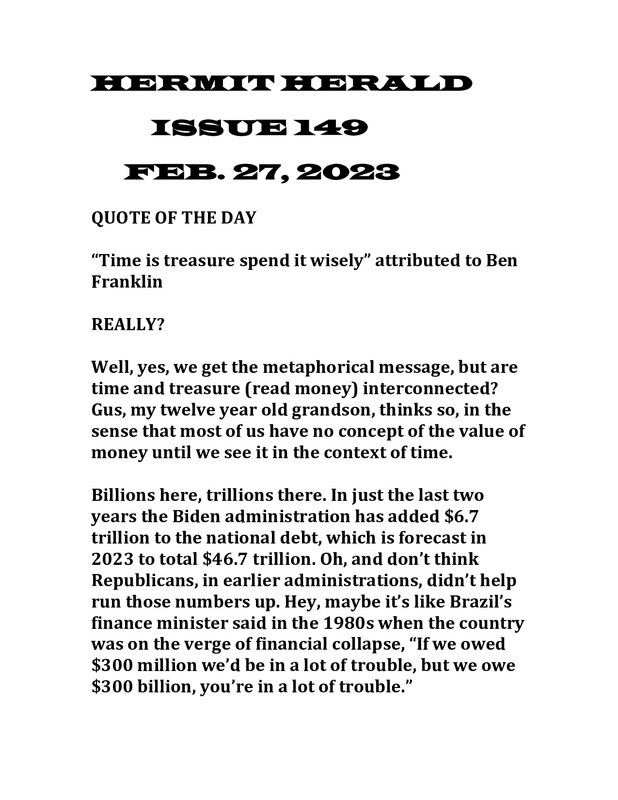 2023-02-27
2023-02-27HERMIT HERALD, ISSUE 149
what is a trillion -
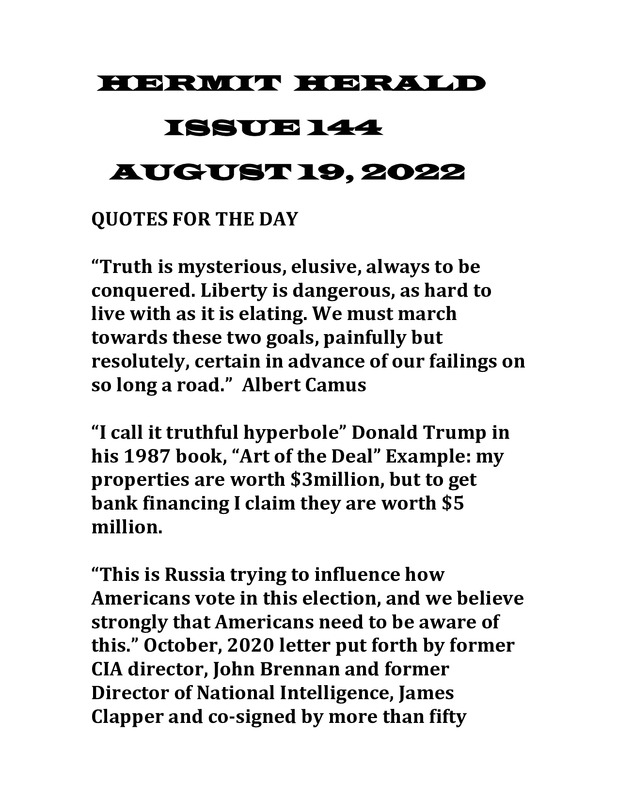 2022-08-19
2022-08-19HERMIT HERALD, ISSUE 144
TRUTH AND LIBERTY SUBJECTIVE -
2021-05-03
Business As Usual
I am a software engineer at a small, fairly conservative, company in PA. Because of its small company status it was never required for our employees to work from home, at least that was what they told us, and throughout the pandemic it was in fact a requirement that we work from the office. I wasn’t surprised when I was told I would be traveling to Washington state but I was apprehensive. A few of our employees were getting stick but I had so far been safe. On May 3rd 2021 I drove to the airport with a mask on my face and hand sanitizer in my hand. The airport was fairly empty as it was early but the few people that wandered the terminals were wearing masks. My flight was long but I got some sleep with the help of some Dramamine. That night my coworkers went out to eat but I decided to order in. The next morning I headed downstairs to head out for my first appointment. At the registration counter there were brown paper lunch bags sitting out in a neat row, the woman behind the desk asked me if I would like a breakfast bag to-go. As I walked over to pick up one of the bags she explained to me how due to Covid-19 they are not longer serving a hot buffet breakfast but are instead were providing this to-go bag options, I smiled from underneath my mask and thanked her. The bag had a banana, a granola bar, a yogurt and a bottle of water. I drove to the meeting site and headed inside, there were few people around but I noticed no one was wearing a mask, I felt like my light blue mask was a huge neon sign directing everyone’s attention to me. When I arrived at the designated meeting room I set up my computer and prepared the demo while I waited for others to arrive. One by one they walked in, greeted me, shook my hand and took a seat. Still no one was wearing a mask or if they were it was not secured properly, I felt embarrassed being the only one with a mask on. Once everyone arrived I stood up and looked at the room, everyone was looking right back at me, waiting. I took off my mask and began the meeting. The rest of the week was more of the same and the trip home was uneventful. A few days after getting home I tested positive for Covid-19 and was finally allowed to work from home, at least until I got better. -
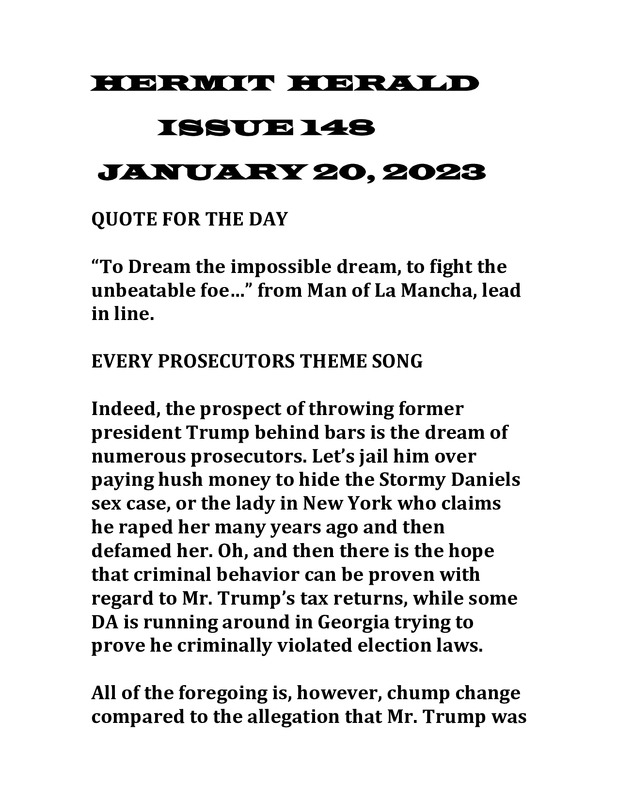 2023-01-20
2023-01-20HERMIT HERALD, ISSUE 148
CONVICTING TRUMP -
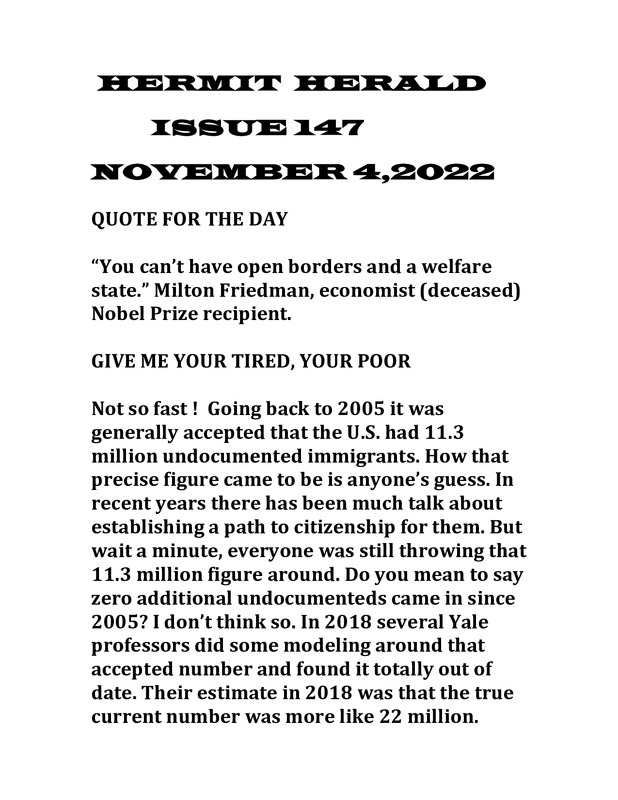 2022-11-04
2022-11-04hermit HERALD, ISSUE 147
Welfare state can't have open borders -
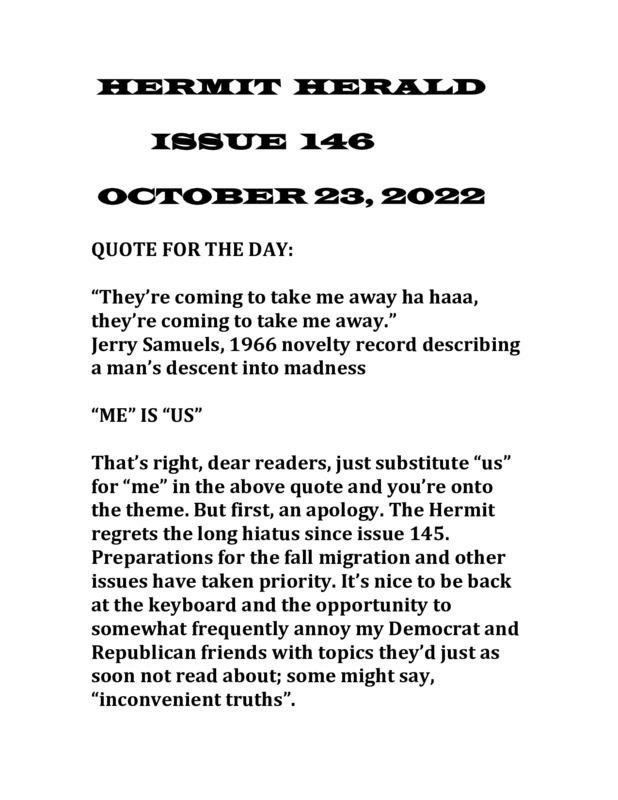 2022-10-23
2022-10-23HERMIT HERALD, ISSUE 146
DEMOCRACY AT RISK -
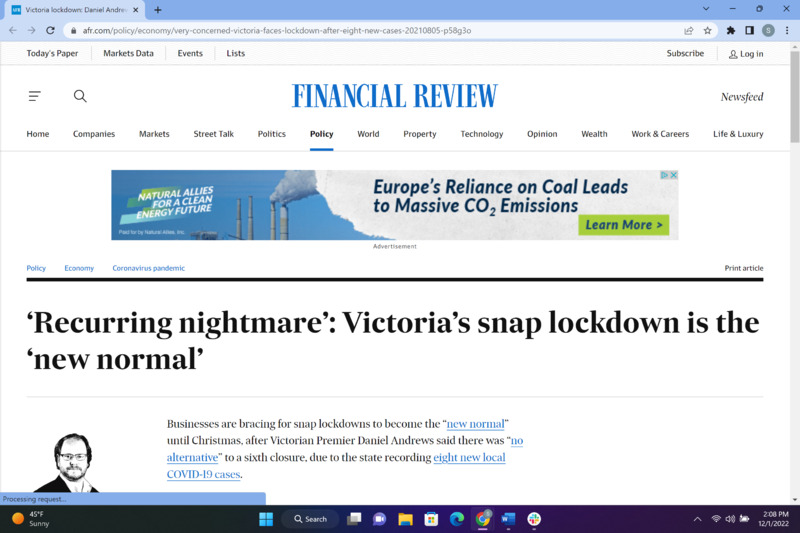 2022-10-30
2022-10-30Silenced voices of the commoner
The recent Covid-19 pandemic has had immense local and global ramifications, especially for us Victorians who have experienced the world’s longest lockdowns. It was a significant worldwide event which will certainly be looked back upon by future generations, just as we have analysed previous historical diseases, such as the bubonic plague. But how should archivists determine which sources, and likewise which voices should be permanently preserved within the historical record? Traditionally, an archive is a collection of documents that archivists have selected to be permanently preserved as sources for future historical or other forms of research. Initially, only scholars with an ambition to conduct historical research had access to archives, but their digitisation and free nature have ensured that anyone is able to access the documents they contain online. However, the process of creating both physical and digital archives is inherently flawed. Archivists have a formidable power to evaluate which sources are “worthy of inclusion”, and simultaneously which ones are not; essentially what compromises the historical record. Therefore, although archivists are characterised as unbiased and impartial individuals, they are inextricably influenced by “societal biases” in their decision-making, as they simply have to select what they personally believe will have value to future researchers. It has culminated in them privileging and prioritising the voices of individuals within positions power, which has indefinitely created “gaps within the historical record” through inhibiting the voices of those without it. Rodney G.S. Carter echoes the problem in asserting that the existence of archival “silences” is the “manifestation of the actions of the powerful”, which has a substantial impact on how marginalised groups produce and likewise form both social history and memory. Ariella Aïsha Azoulay has cautioned readers that “digital archives are no exception”. With this in mind, if we consider the 19-month impact of the pandemic upon Victoria, I am certain that archivists will acknowledge the voices of those within positions of power when determining what sources should be preserved. Of particular importance would be those of primary actors that shaped Victoria’s lockdown experience, most importantly the protagonist of the lockdowns, Premier Daniel Andrews (fig.1). Figure 1. Video of Premier announcing sixth lockdown, cited in Patrick Durkin, “’Recuring nightmare’: Victoria’s snap lockdown is the ‘new normal,’” Financial Review, August 5, 2021, URL: https://www.afr.com/policy/economy/very-concerned-victoria-faces-lockdown-after-eight-new-cases-20210805-p58g3o. I am aware of the threat of “information overload” both real and digital archives currently face with an abundance of available sources, but I would argue that the preservation of major political statements alongside previously supressed voices would be beneficial to any archive created surrounding the Victorian Covid-19 experience. A consideration of the experiences of marginalised voices would be imperative to a future historian, as it would enrich historiography by offering insight into the social-political dynamics of the event, and its psychological impact beyond official government and political documents. I will now consider the value of this “bottom-up approach” in capturing the Victorian pandemic experience from the viewpoint of the common man, me, a historically marginalised group within the realm of archives. I personally wasn’t too concerned about the first lockdown and its stage three and four restrictions as they would “flatten the curve” of infectious cases, providing our health system with the best opportunity to tackle the fast-spreading virus. Life as we know it changed though with only four reasons to leave home; shopping, exercise, caregiving, and work. The café I worked at had to shift to “take away only”, as many others (fig.2). Figure 2. The Food Republic Café, “covid update for customers,” Blackburn, March 23, 2020, URL: https://www.facebook.com/thefoodrepubliccafe. I was still able to work alongside my barista colleague and friend Max which was pretty good, and I was able to perfect my coffee artwork (fig.3). Figure 3. The Food Republic Café, “promotional post during lockdown 1” Blackburn, April 8, 2020, URL: https://www.facebook.com/thefoodrepubliccafe. I was also able to continue exercising and riding my bike, but I wasn’t able to see or visit any friends or family, which initially seemed like a fair sacrifice to make for the health and wellbeing of all Victorians (fig.4). Figure 4. George Vesnaver, Selfie on bike ride, April 10, 2020, photograph, Main Yarra Trail, Melbourne. However, after being continuously plunged in and out of lockdowns by the time the sixth one came about, I was very angry to say the least as representative within my covid journal entry (fig. 5). Figure 5. George Vesnaver, Covid Journal Entry, October 27, 2022, photograph, Kew East, Melbourne. Laura A. Millar’s observation that “the concept of evidence” must be broadened as opposed to its current restrictive and rigid format adopted by archivists has reaffirmed my belief that my experience and that of other regular people should not be forgotten. My sources may just seem like information to an archivist because of their form, but they are filled with evidence of this historic moment. Their eternal preservation within an archive would serve anyone wanting to write about the Victorian Covid-19 experience in the foreseeable future. For example, figure 2. would enable one to see how government information was disseminated via social media; the confirming and likewise conforming of political decisions. Figure 3. would reveal the way in which people adapted to Victoria’s first initial lockdown via humour, helping us remember attitudes towards the past event. Figure 4. would showcase a sense of normality during unprecedented times, through an ability to continue exercising. But most importantly the response depicted in figure 5. towards figure 1., a first-hand account of the psychological impact of the endless lockdowns instigated by those with political powers. Winston Churchill once said that “history is written by the victors”, so considering those with and without power survived the pandemic it seems only fair that all our voices should be recognised in the historical record. -
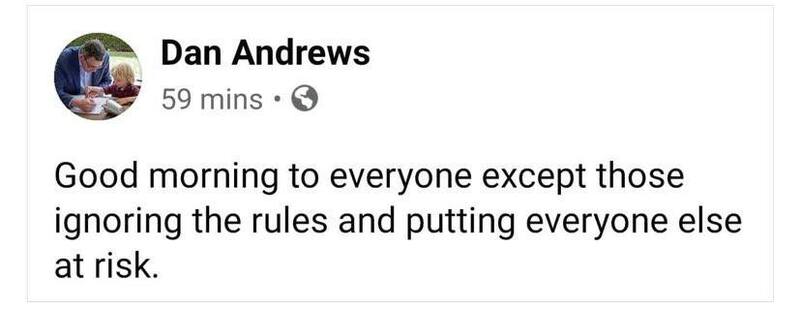 2020-04-04
2020-04-04HIST30060: Daniel Andrews' Facebook Post
This is a screenshot of a Facebook post made by Daniel Andrews’ public page on 4th April 2020. This post exemplifies the Victorian Premier’s ability to co-opt social media trends in promoting his own political agenda. Popular in early 2020, the meme followed the template of “Good morning to everyone except,” followed by exclusion of a relatively a niche social group. This screenshot illustrates the subtle use of social media as propaganda by the Andrews government. Andrews’ social media pages are seldom thought of as such, as the skill of his social media team has allowed him to maintain a popular and likeable social media persona. In an age of ubiquitous social media use, the Andrews government has used social media very effectively to protect its legitimacy and justify its methods. For example, the screenshot highlights the use of guilt by the Andrews government to legitimise health restrictions. The government consistently stressed that the pandemic restrictions were for the benefit of the public and necessitated complete compliance. Those who rejected health advice were endangering the entire community and “putting everyone at risk.” This post therein encapsulates sophisticated government propaganda and the co-opting of social media for political purposes. I selected this post as someone influenced by the sophisticated campaign of government messaging. It lead me to resent rule-breakers and see the prolonged restrictions as a legitimate use of government authority to protect the public. As someone who entered the pandemic as a supporter of the Labor Party and Daniel Andrews personally, I no longer think the severity and length of the lockdowns were necessary. Yet, his social media presence certainly made him likeable, funny, and relatable at the time. -
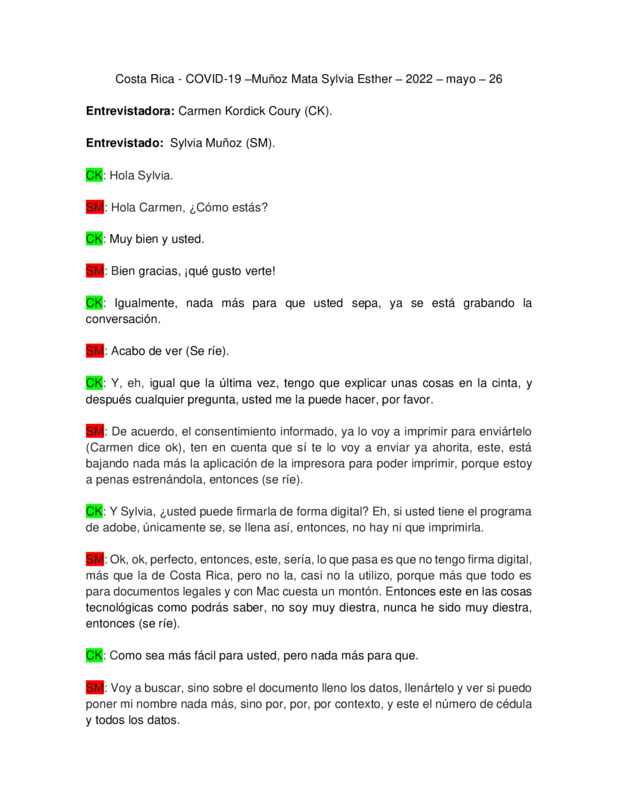 05/26/2022
05/26/2022Silvia Muñoz Mata Oral History, 2022/05/26
En esta entrevista Silvia Muñoz Mata es entrevistada por Carmen Kordick Coury concerniente al covid-19 en Costa Rica. Para empezar, Silvia habla de las cosas que habían cambiado desde el año anterior. Habla de su hogar y como se sintió cuando se enfermó. De la vacuna, teorías conspirativas, y del gene antivacunas incluyendo su novio. De allí, Silvia habla de su trabajo, de la salud mental, el abuso y violencia doméstica. Hablan de cuestiones sociales y el tema de la economía, gente sin trabajo y inflación. Pasan el tema de la inflación, la política, las elecciones y los candidatos. También hablan del gobierno, pensiones de lujo, hospitales y salud y el uso de las mascarillas. Para terminar, hablan de las fuentes principales de información y del futuro. -
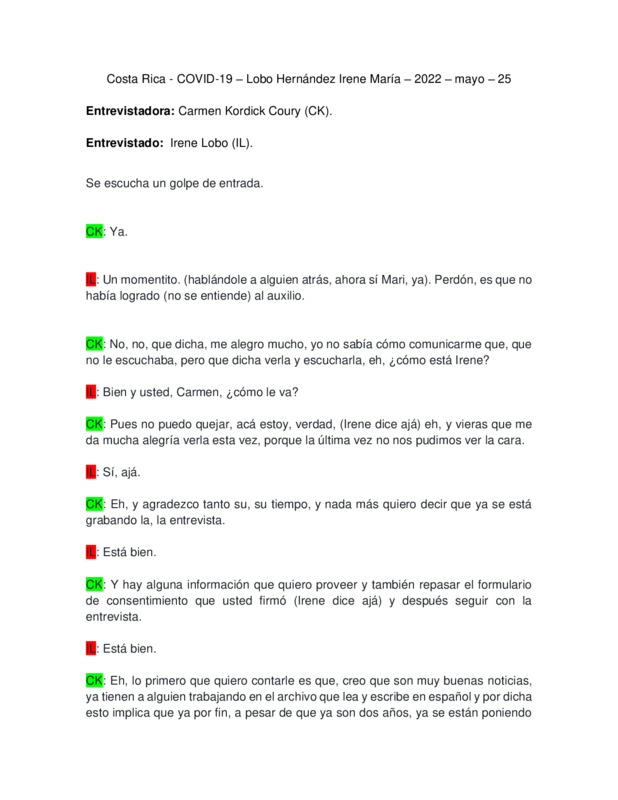 05/25/2022
05/25/2022Irene Lobo Hernández Oral History, 2022/05/25
En esta entrevista Irene Lobo Hernández es entrevistada por Carmen Kordick Coury concerniente al covid-19 en Costa Rica. Para empezar, hablan de lo que ha cambiado desde el ano anterior. Habla de su trabajo de abogada, del desempleo y la economía. Irene también habla del gobierno, de las vacunas y de gente que no confía en las vacunas. Habla de las elecciones y los candidatos. De gente conocida que se han enfermaron y unos que han fallecido por la pandemia. Irene también habla de las formas de celebrar la vida de su hermana que falleció el año anterior, habla de su familia y el uso de las mascarillas. Para terminar, habla de sus fuentes principales de información, la información falsa y sus deseos para el futuro. -
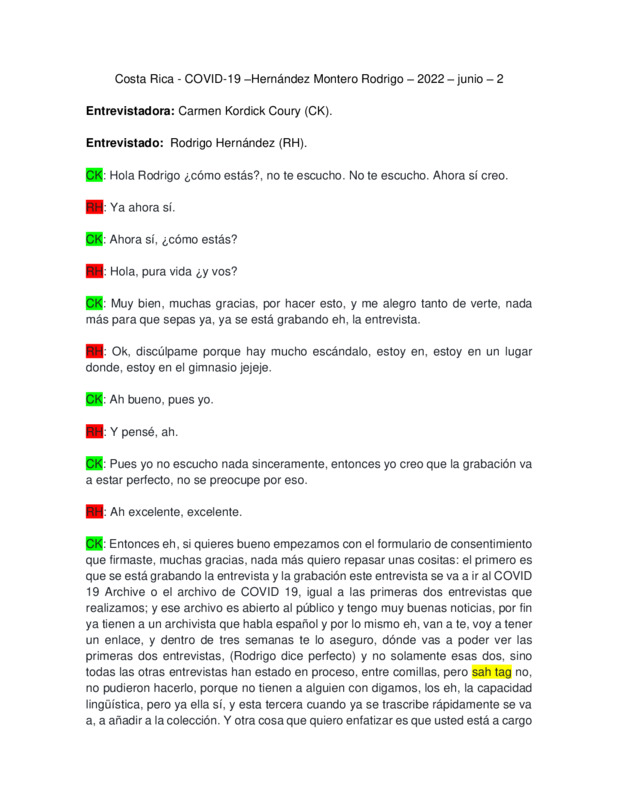 06/02/2022
06/02/2022Rodrigo Hernández Montero Oral History, 2022/06/02
En esta entrevista Rodrigo Hernández Montero es entrevistado por Carmen Kordick Coury concerniente al covid-19 en Costa Rica. Empiezan con que había cambiado desde el ano anterior. Hablan del gobierno, de la vacuna y su experiencia cuando el se vacuno. Habla de sus compañeros que aún no se habían vacunado y de como le fue a su familia cuando se enfermaron del covid. Rodrigo también habla de la caja, describe su trabajo de odontólogo, habla de sus pacientes y del uso de equipo de protección. Habla de sus compañeros del trabajo y su vida social. De la economía, la inflación y la pobreza, De allí, Rodrigo habla de su hogar y familia, del uso de la mascarilla y de las fuentes de información. Para terminar, habla de las elecciones y del futuro. -
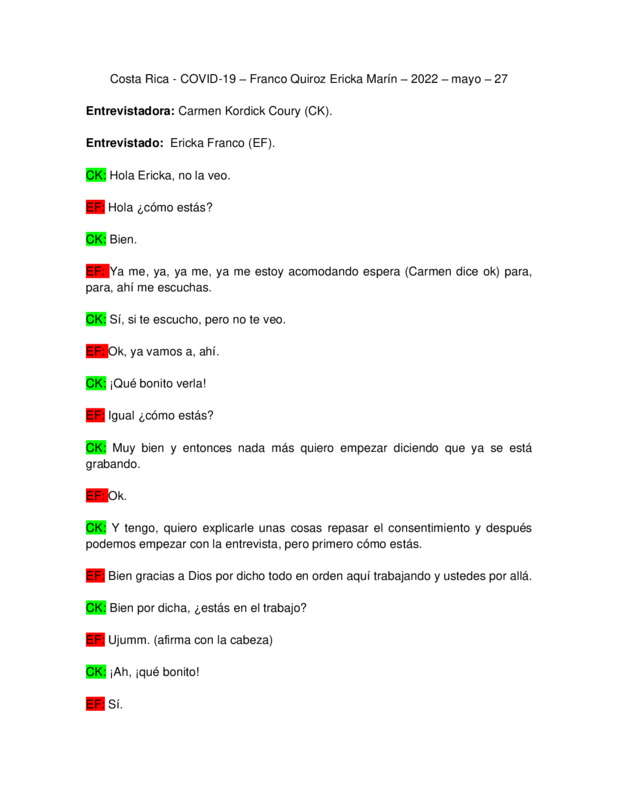 05/27/2022
05/27/2022Erika Franco Quirós Oral History, 2022/05/27
En esta entrevista Erika Franco Quirós es entrevistada por Carmen Kordick Coury concerniente al covid-19 en Costa Rica. Hablan de los cambios que habían pasado desde el año anterior y cuenta que ella empezó ir al trabajo presencialmente tiempo completo. Habla de las vacunas y mascarillas. Erika habla de su trabajo como orientadora para un colegio técnico profesional y también habla de los estudiantes. De allí, ella habla del gobierno, cuenta que ella contracto COVID, y habla de la gente que no se quiere vacunar. Habla de su vida social, fuentes de información donde ella se educa, y la economía. Para terminar, ella habla de las elecciones, salud mental y el futuro. -
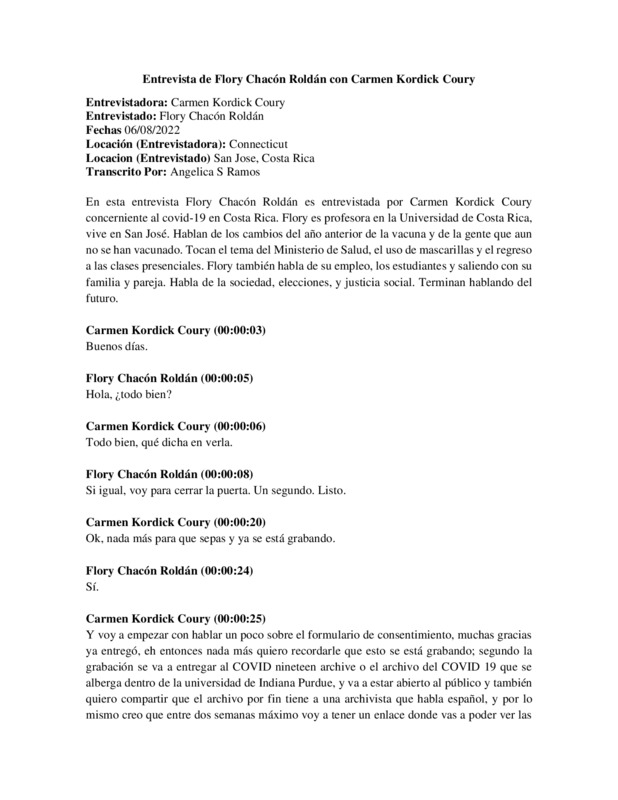 06/08/2022
06/08/2022Flory Chacón Roldán Oral History, 2022/06/08
En esta entrevista Flory Chacón Roldán es entrevistada por Carmen Kordick Coury concerniente al covid-19 en Costa Rica. Flory es profesora en la Universidad de Costa Rica, vive en San José. Hablan de los cambios del año anterior de la vacuna y de la gente que aun no se han vacunado. Tocan el tema del Ministerio de Salud, el uso de mascarillas y el regreso a las clases presenciales. Flory también habla de su empleo, los estudiantes y saliendo con su familia y pareja. Habla de la sociedad, elecciones, y justicia social. Terminan hablando del futuro. -
2022-08-30
HERMIT HERALD, ISSUE 145
Political divisions greatest threat to U.S.; 7 Billion weapons left in Afghanistan; Opioid $ penalties; $300 billion college loan forgiveness; college tuition up 6x inflation; 16% of voters would not have voted for Biden; election not stolen at voting booth; Democrats gaining fast on midterm elections; Trump welcomes embrace of QAnoners -
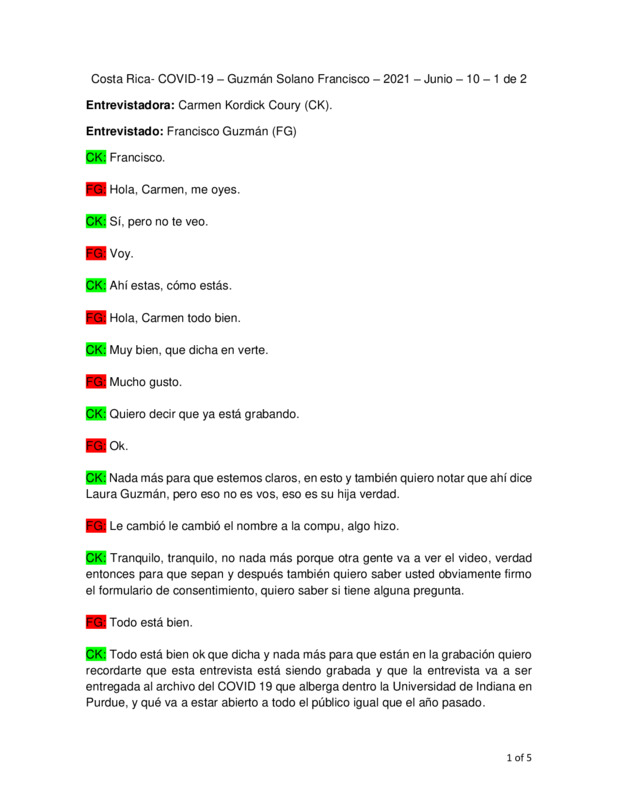 06/10/2021
06/10/2021Francisco Guzman Solano Oral History, 2021/06/21
En esta entrevista Francisco Guzman Solano es entrevistado por Carmen Kordick Coury concerniente al covid-19 en Costa Rica. Empiezan hablar de los cambios que Francisco ha visto desde el ano anterior. Hablan de la economía y el gobierno, de su trabajo y la vacuna. También hablan del aumento del crimen, de las drogas, y de las noticias falsas. De la Caja y el ministro de Salud. Francisco también habla de su familia y su hogar, de las fuentes principales de información y la sociedad. Terminan hablando de las clases virtuales de su hija, de la educación y del Ministerio de Educación. -
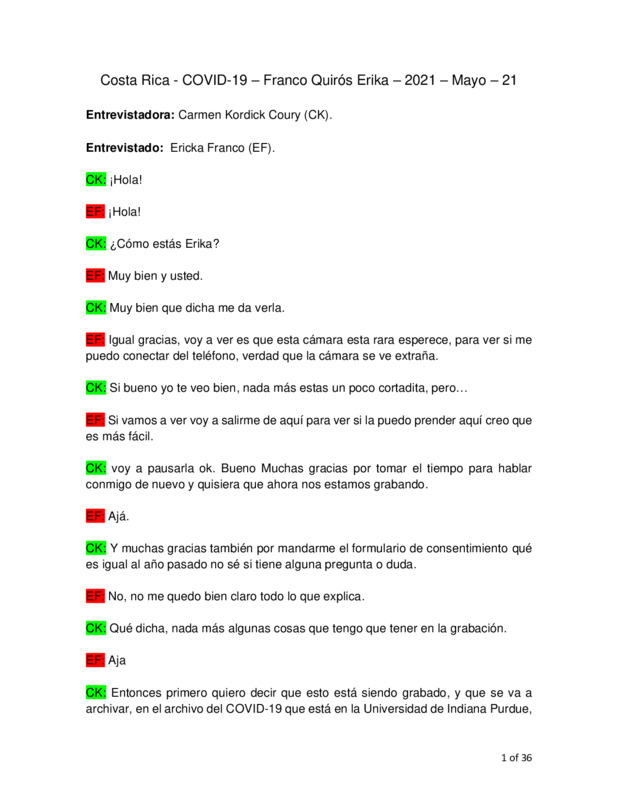 05/21/2021
05/21/2021Erika Franco Quirós Oral History, 2021/05/21
En esta entrevista Erika Franco Quirós es entrevistada por Carmen Kordick Coury concerniente al covid-19 en Costa Rica. Habla del regreso al trabajo presencial y los protocolos que tiene que seguir en el trabajo. Habla de las vacunas, del gobierno y de las personas que viajan para vacunarse. También habla de los cambios que ha visto en la sociedad, de la gente que son contra la vacuna, su familia y vida personal. Erika también habla del uso de la máscara y del ministro de salud. Para terminar, ella habla de las fuentes principales de noticias que usa, de las noticias falsas y de el futuro. -
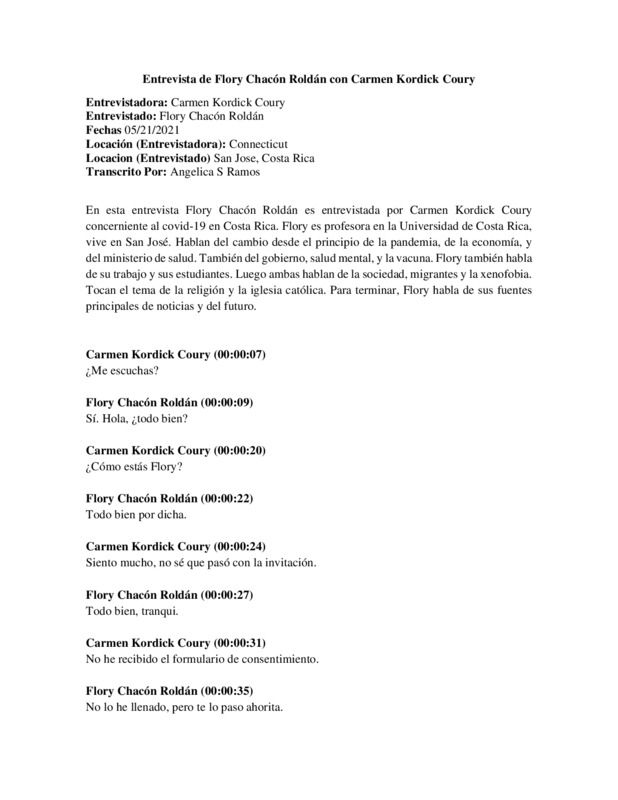 05/21/2021
05/21/2021Flory Chacón Roldán Oral History, 2021/05/21
En esta entrevista Flory Chacón Roldán es entrevistada por Carmen Kordick Coury concerniente al covid-19 en Costa Rica. Flory es profesora en la Universidad de Costa Rica, vive en San José. Hablan del cambio desde el principio de la pandemia, de la economía, y del ministerio de salud. También del gobierno, salud mental, y la vacuna. Flory también habla de su trabajo y sus estudiantes. Luego ambas hablan de la sociedad, migrantes y la xenofobia. Tocan el tema de la religión y la iglesia católica. Para terminar, Flory habla de sus fuentes principales de noticias y del futuro. -
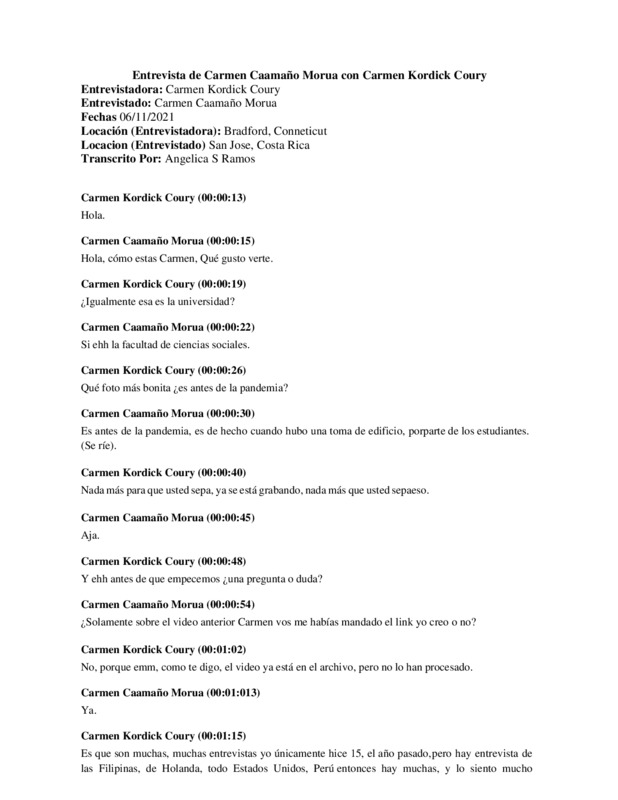 06/11/2021
06/11/2021Carmen Caamaño Morua Oral History, 2021/06/11
En esta entrevista Carmen Caamaño Morua es entrevistado por Carmen Kordick Coury concerniente al covid-19 en Costa Rica. Carmen es profesora en la Universidad de Costa Rica y vive en San José. Habla de su trabajo virtual en la universidad, del crisis de la salud mental y de la gente que cree en las teorías de la conspiración. Carmen habla de la relación entra las ciencias y la religión y como eso afecta los sentimientos hacia la vacuna. Habla de la xenofobia, el racismo y el clasismo. También habla de las vacunas y la respuesta del gobierno. Para terminar, Carmen habla del gobierno, la economía y las noticias. -
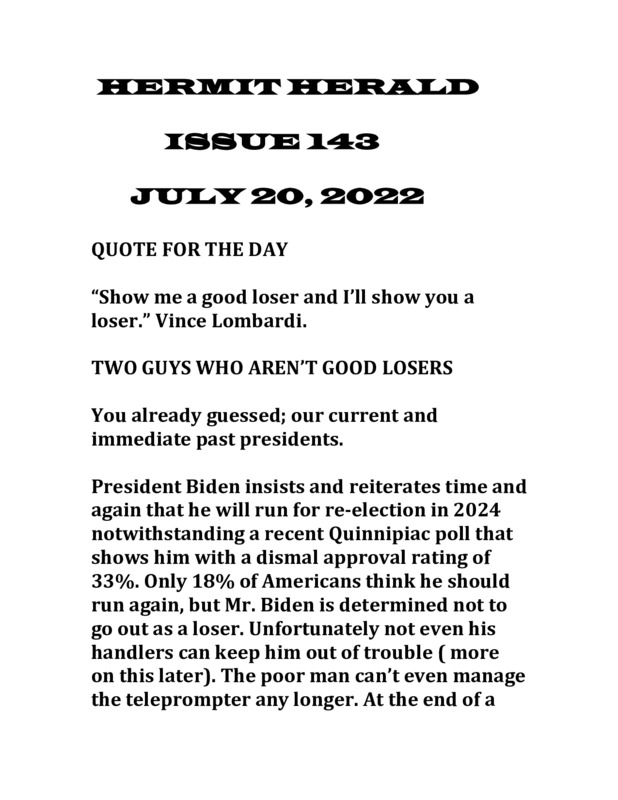 2022-07-20
2022-07-20Hermit HERALD, ISSUE 143
Biden/Trump 2024? -
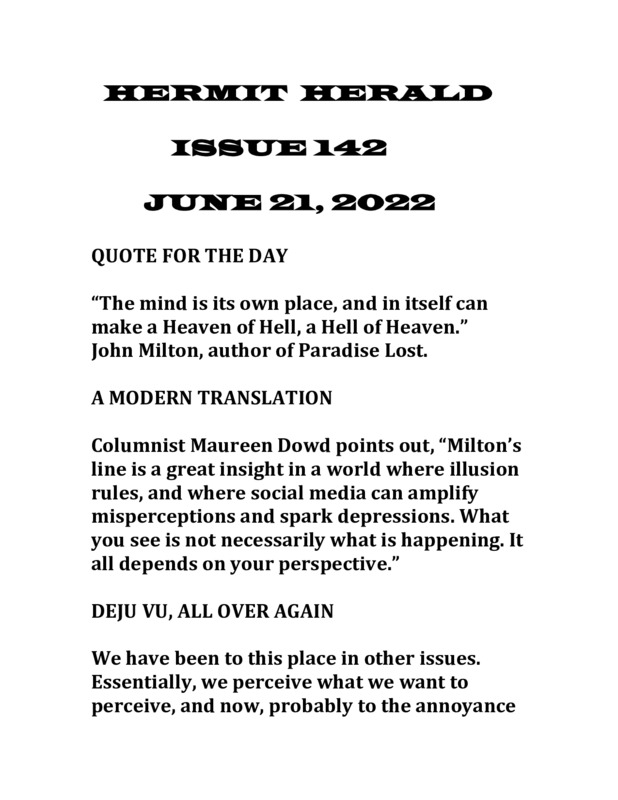 2022-06-21
2022-06-21HERMIT HERALD, ISSUE 142
We perceive what we want to perceive -
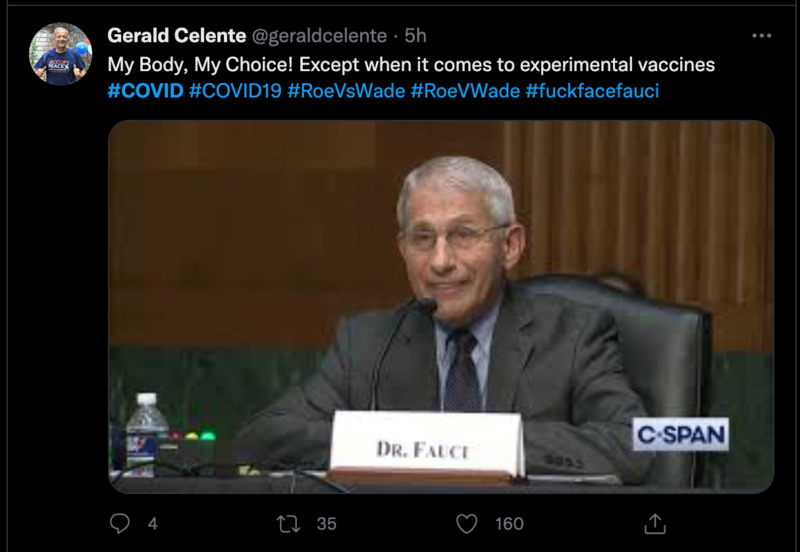 2022-06-25
2022-06-25My body, my choice...except with experimental vaccines
This is a tweet from geraldcelente. This person is expressing their anger towards Dr. Fauci and his ideas on what "my body, my choice" actually consists of. Within the vaccine skeptic communities, people like Dr. Fauci are held in contempt due to his stances on things like masks, vaccines, and lockdowns. -
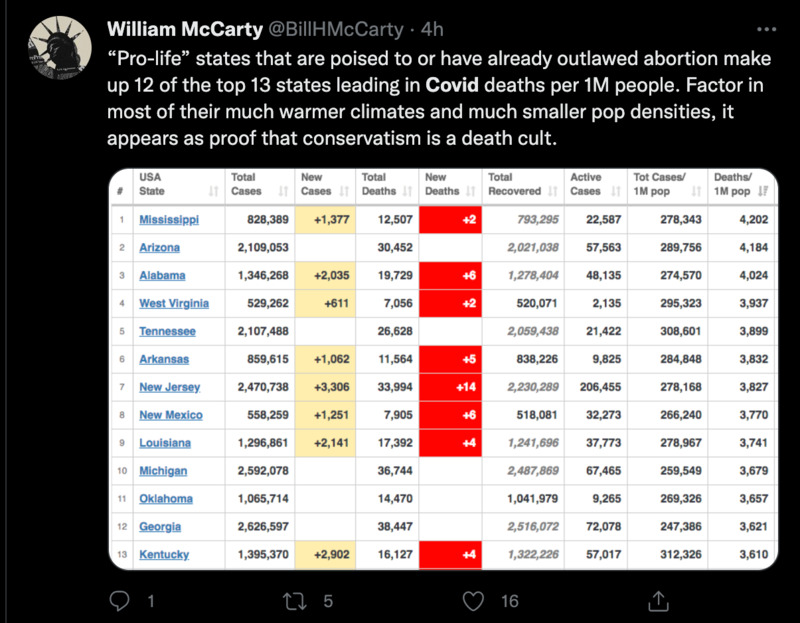 2022-06-25
2022-06-25"Pro-life" and COVID death
This is a tweet from BillHMcCarty. This person is criticizing the amount of COVID deaths that are happening is states that are looking to outlaw or heavily restrict abortion. -
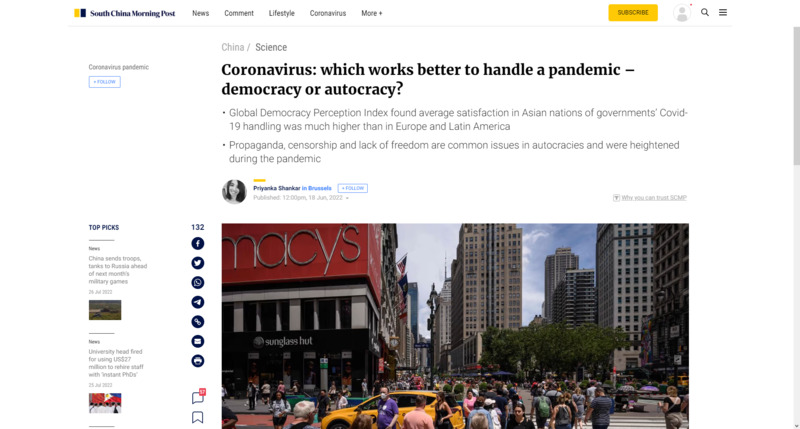 2022-06-18
2022-06-18Coronavirus: which works better to handle a pandemic – democracy or autocracy?
This is a news story from the South China Morning Post by Priyanka Shankar. This article is discussing the difference in responses based on forms of government. When it came to handling the pandemic, people from Asian countries where restrictions were much tougher rated a higher rate of satisfaction in government response compared to Latin America and Europe. This was taken from the Democracy Perception Index. According to researcher Fredrick DeVeaux, a leader in conducting this survey, the tight restrictions common in Asian countries are generally accepted because it gets associated with low death rates. The survey does make mention that in countries such as Iran and China, they hid data about the virus from their citizens, affecting their overall response to changes in lockdowns. However, Singapore is also authoritarian, and the prime minister has made an effort to create transparency in what is occurring, so items get hoarded less. Overall, the article claims that the mass mobilization of people and goods under authoritarian regimes fares better than democracies do at creating an effective COVID response. -
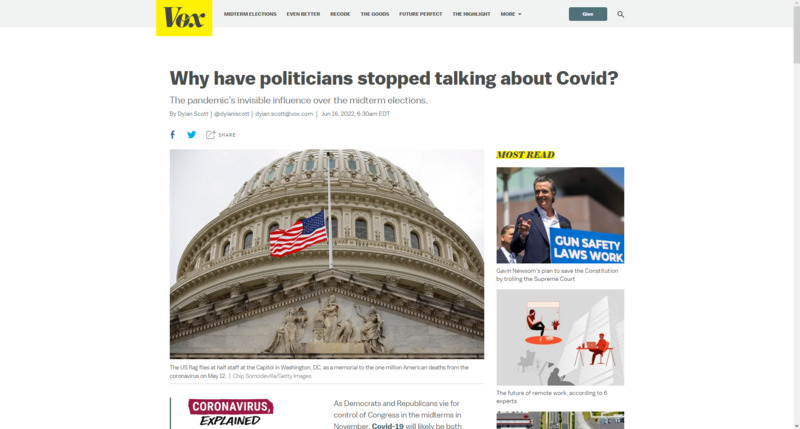 2022-06-16
2022-06-16Why have politicians stopped talking about Covid?
This is a text story from Vox by Dylan Scott. The article claims that COVID helped sink President Donald Trump's re-election campaign, yet despite this, it is not being focused on by either party. Though, this author believes the Democrat response hasn't been much better, with people not really touting President Joe Biden's vaccine rollout and other initiatives. The author links the reason for inflation being COVID interrupting supply lines, which is on people's minds for this midterm election. According to Gallup polling, COVID has lost importance in many people's minds, with it falling behind Russia and gas prices. On the Republican side of things, COVID is rarely mentioned, and if it is, it is in a negative light. Scott says that candidates favored by Donald Trump have gone against his ideas, with them being more skeptical of vaccines, and some refusing to get the vaccine at all. COVID is being tied to an anti-establishment attitude that has been rising within the Republican party. As for my own opinion on this piece, I believe that is does bring up an interesting point with linking COVID to current inflation. I do agree that COVID has impacted the economy for the worst with supply chains being more limited and rising spending of the federal government to counter it, but I do not think it can explain everything. Federal spending in general has been on an increase, which is driving up the cost of items, and not all that spending is COVID related. In addition to that, the shutdown of important pipelines has made reliance on foreign oil more of a necessity, which then drives up gas prices. These types of decisions can't all be traced back to COVID. So while I do think COVID has impacted the economy, I do not think it explains nearly all the economic issues the United States is facing. -
 2022-06-09
2022-06-09Biden administration lays out its plan for Covid-19 vaccinations for children under 5
This is a news story from CNN by Donald Judd and Betsy Klein. The Biden administration has announced a vaccine rollout for children five and under. The vaccinations are to start as early as the week of June 20. -
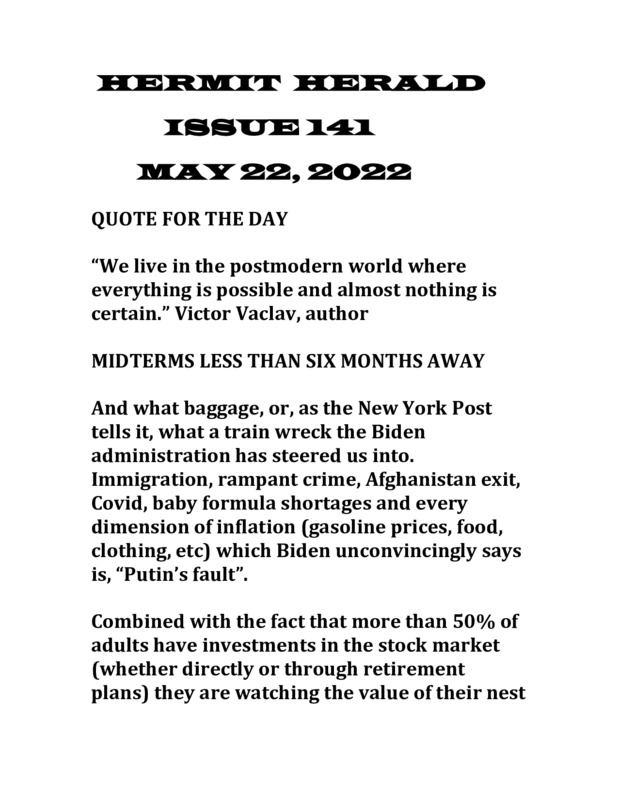 2022-05-22
2022-05-22HERMIT HERALD, ISSUE 141
Republican blowout at midterms? not so fast -
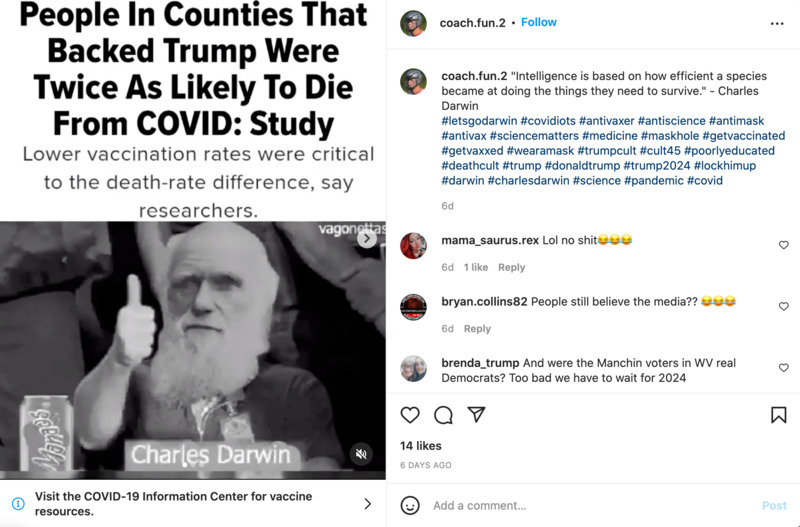 2022-05-22
2022-05-22People in counties backed by Trump were twice as likely to die from COVID: Study
This is an Instagram post by coach.fun.2. The study is not linked in the description, but I did find the article the title is referencing. The story come from the Huffington Post. It says that political affiliation is linked to vaccination rates, which some claim are what is making the difference between living and dying from COVID. Wealth and access to certain care are also taken into account. The study was from Brown and the study claims that states that went heavily for Trump had more cases of COVID deaths. -
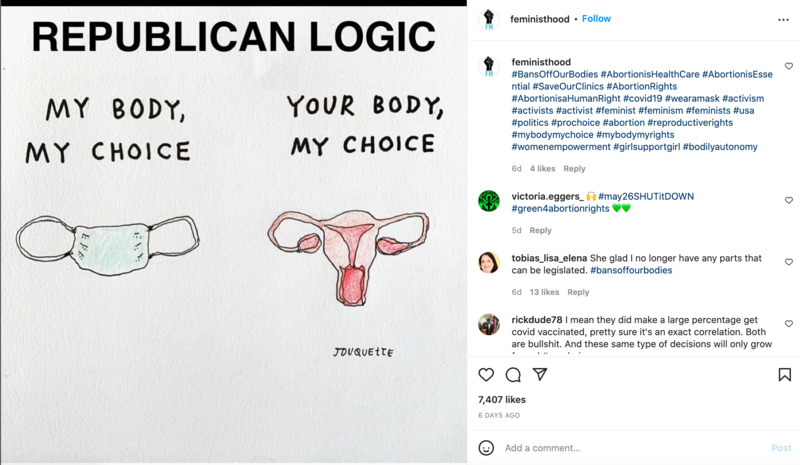 2022-05-22
2022-05-22Republican logic
This is an Instagram post from feministhood. It is making the comparison between the rhetoric Republicans have had regarding COVID versus abortion. The person writing this says thinks that it is rather contradictory. The contradiction comes from thinking that "my body, my choice" applies to masks and vaccines, but should not apply to abortion. The commonality is that both issues deal with bodily autonomy. -
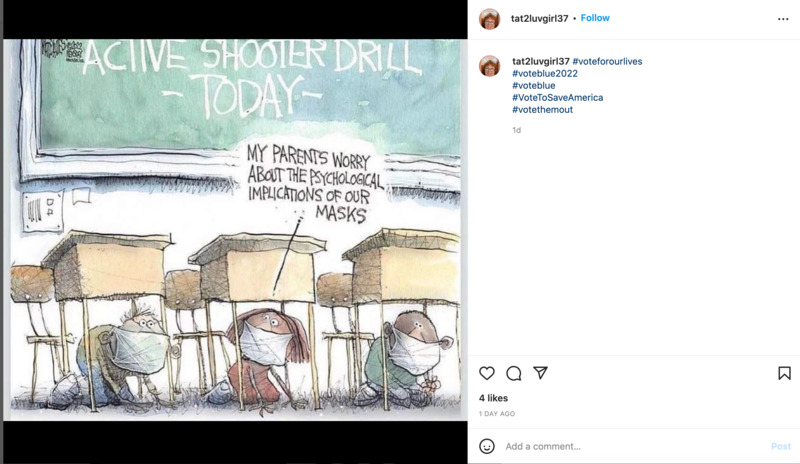 2022-05-28
2022-05-28My parents worry about the psychological implications of our masks
This is an Instagram post by tat2luvgirl37. This is a political comic referencing both school shootings and mask wearing. The comic artist is trying to create irony where the parents of one of the kids seems to worry more about mask wearing rather than gun protection. The mask versus no-mask camp is highly partisan, with the no-maskers typically being Republican in the United States, and the pro-maskers being Democrat. Additionally, the Republican party is overall viewed as being more-pro gun, which some critics say is the reason why mass shootings happen more often. As we can see by the #voteblue used by the person that reposted this comic, it is very politically charged and meant to be criticism against those that are pro-gun and anti-mask. -
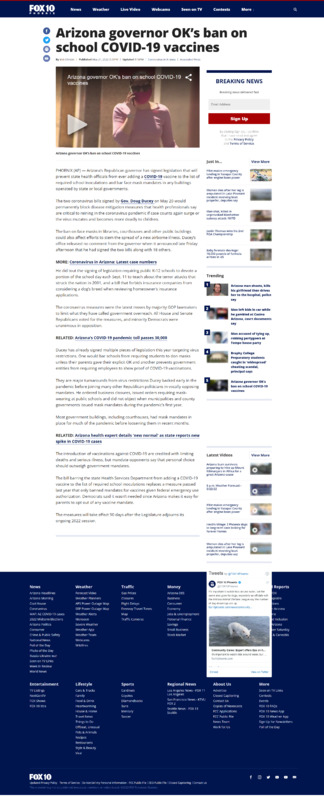 2022-05-21
2022-05-21Arizona governor OK’s ban on school COVID-19 vaccines
This is a news story from Fox 10 News by Bob Christie. Governor Doug Ducey has recently signed legislation that would prevent state health officials from adding COVID-19 vaccines to list of required school vaccines. This legislation was done by the GOP to prevent government overreach. -
 2022-05-12
2022-05-12Covid-19 narrows long-standing Latino mortality advantage, study finds
This is a news story from NBC News by Nicole Acevedo. Latinos have been shown to have lower mortality rates compared to non-Hispanic whites, where they live an average of three extra years. This changed with the virus. In a study published by the Lerner Center for Public Health Promotion, COVID-19 has been shown to kill Latinos 65 or older at 2.1 times the rate of whites in 2020. This number decreased slightly in 2021, which was at 1.6 times the rate of whites. So far this year, it has been at 1.2 times the rate of death. In total, COVID has killed 124,000 Latinos since the start of the pandemic in the United States, which accounts for 17% of deaths. The reason the Latino death rate is high is debated, but some say it is because Latinos in the United States are less likely to have access to quality healthcare or have jobs that would expose them to the virus more often. -
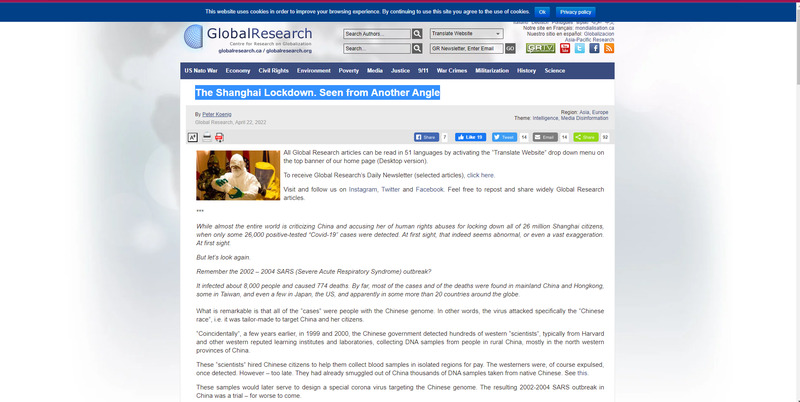 2022-04-22
2022-04-22The Shanghai Lockdown. Seen from Another Angle
This is a screenshot of an article from globalresearch.ca about looking at the most recent Shanghai Lockdown. Yet, the article does not talk about the Shanghai lockdown until maybe halfway through the article. It goes on a tirade about how the 2002-2004 SARS outbreak went after the "Chinese race" and how it became an early trial for China before COVID. Then the author states that China has "mastered the disease" and managed to reopen its economy by the end of 2020, which leads to the conclusion that China's economic growth hardly suffered during the newest outbreak. The author asserts that China will surpass the U.S. economy in 3-4 years and then launches into a world history lesson about Cold War politics. The author tends to wander in the article, going from pandemic skepticism on vaccines sterilizing women, being lied to the government, or having HIV ingredients. Then somehow, Ukraine has virus labs...I don't know. Somehow, Russia is involved in this article, but I'm not sure why. I don't know how this is supposed to persuade its audience because the author goes all over the place with his points. I suppose skeptics will like the fact that the vaccine is being questioned here? Personally, I don't even understand why skeptics would want to read this because I think they would lose even more brain cells from just trying to read it. I think this article is just a gigantic mess and it makes my brain hurt. I find myself just not understanding a single thing that is being written in this article. I don't understand why anyone would even understand or like this article. It literally makes absolutely no sense and there are even typos in it. The look of this website and article makes me want to run my virus protection at least three times because I feel like they're going to infect my computer with a Trojan horse. -
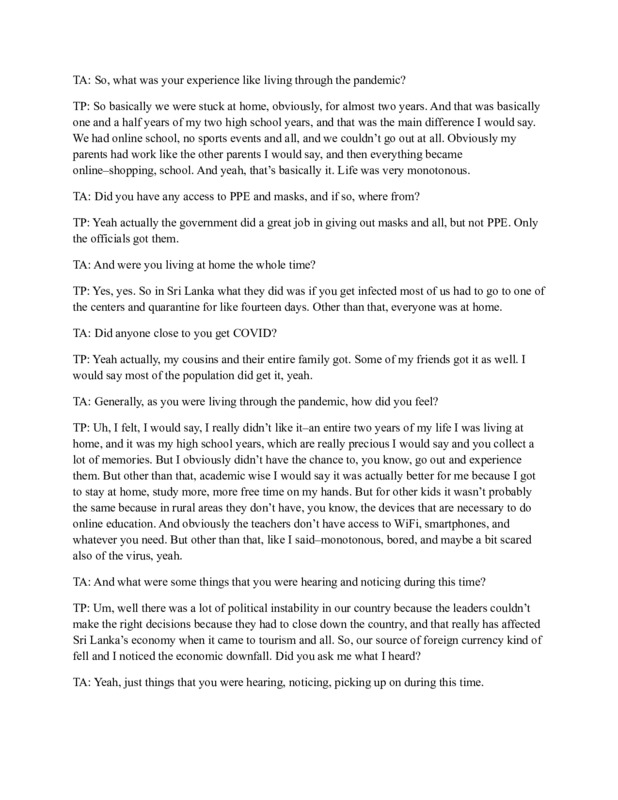 2022-05-04
2022-05-04Experiencing the Pandemic as a Student in Sri Lanka
It provides the pandemic perspective of a student from Colombo, Sri Lanka. -
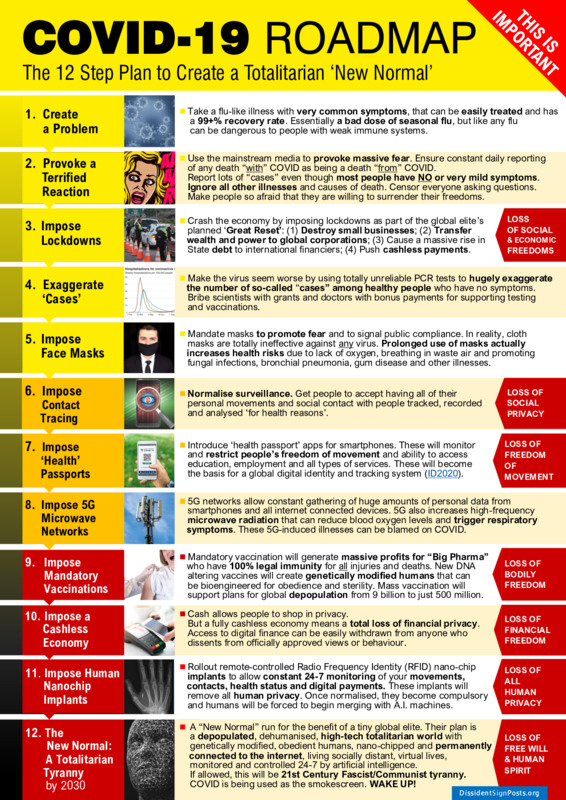 2022-05-09
2022-05-09I can't even make this up anymore
First off, I do not agree with the attached pdf to this story. When I first looked at this awful website, and saw that they had FREE DOWNLOADABLE PRINTS, I immediately sighed because this is the type of stuff that's turning people AWAY from getting a vaccine. These people are the reason why people can't trust "media". It is also very obvious that these people have never taken a history or any type of political science class in their lives. Let's analyze a little bit of what they say. First off, in their step 1 of "create a problem" they compare COVID-19 to something like the flu. Given, I'm sure people have died from the flu. I mean, the influenza pandemic was a thing in 1918. Also important that they even wore masks then! Their step 2 is "provoke a terrified reaction". What I'm getting from this is, we shouldn't be worried. But we should. Any pandemic should be worrying. I can also guarantee you as well that these people didn't give a shit when the AIDS/HIV Epidemic was literally killing so many queer people at an alarming rate, and wasn't addressed until 6 years later after it started. Anyways, the steps that talk about "contact tracing" and "health passports" things are interesting. They talk about surveillance, but surveillance has been happening since the dawn of time. I'm sure muslim's everywhere in the United States could talk more about surveillance than I could as a white person. Health passports? You have to have certain vaccines to attend public school or even a public university. Also, actual passports are a thing. You know, the thing you need to tell other people who you are and where you're from when you visit their country. I'm going to jump to step 10's "Impose a Cashless Economy," anyone that has ever handled cash during a job knows how gross cash is. This pamphlet must've been when the pandemic first happened, because that's when my last job couldn't take cash because we were too afraid to touch anything. Now knowing the information I know now, a lot of places take cash now. But also, people are gross. Half of the time, people are sneezing into their hands or not washing their hands and come out of the bathroom and go to pay and give you cash. Don't even get me started on people pulling money out of their bras. Throughout this entire pdf, they talk about the elite. Which is probably the only thing I agree with them because the rich got richer during the lockdown and even made prices higher. This type of propaganda could be harmful to someone that was already on the fence about vaccines, but the fact that this information is out there instead of the actual science based truth is harmful. It uses familiar words from history to persuade people to not get the vaccine. -
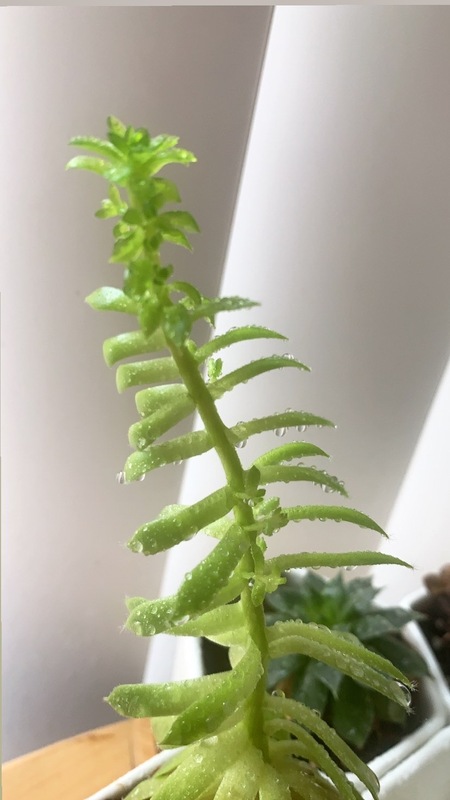 2020-03-18
2020-03-18All Things Will Pass
On this day, I recall watering my succulent and staring out the window with grave uncertainty of what was to come and utter confusion as to what exactly was happening. The stock market had just crashed andante pumped back up within minutes and the news was flooded with death and infection rates rising as people began clamoring for grocery stores to hoard supplies. The past two years living through COVID has felt somewhat like the process of the Calvin Cycle that kept my succulent in this photo nice and healthy. Although it is nearly impossible to articulate what life has been like or what was observed over the last two years, one great lesson I gained is the understanding that nothing is forever. It is all temporary. As I watered my plant with sheer emptiness and mentally checked-out due to the shock of the situation at the time, I began thinking about the Calvin Cycle process that my succulent or any plants outside would go through as my species was in dire panic. The world seemed to have stopped and sped up over night, but life itself remained to be what it was. Then the thought occurred to me. All things will pass. Living through COVID the last two years has seen work-from-home jobs rise to masses. I left one job to work at another and found that this was the worst comfort and behavior our species grew to become adapted to. For once, it has made us disconnected from reality and from each other. By being disconnected, it creates an issue of empathy and connection. The mantra of "connected while away," was shared everywhere when COVID first came about, but two years later, this has become the opposite. An example of this was observing many downplay the deaths of people from the virus, yet become very emotional once it was one of their family members. This could be viewed under a quick search on Google for the Reddit page of "Herman Cain Award." Bringing this page up primarily serves to show that both sides of the COVID discourse became contradictory as both sides were insensitive toward death. Was it due to being separated? I'll allow you to consider this. Another interesting point observed during COVID was the rise of irrational spending and mass speculation. Alan Greenspan once called the mass speculation a product of "Irrational Exuberance." The premise of this best serves that of investing as it describes the investor enthusiasm which drives asset prices higher than they are worth. However, the same could be viewed through the grocery hoarding of toilet paper or food where people became highly speculative of how long thee lockdowns would be. This was also indicative of the housing bubble 2.0 in which the Federal Reserve opened massive quantitative easing and opened cheap lines of credit for many. The result created more greed as people began hoarding one of the basic needs of our species in housing. How can a species feel righteous commoditizing shelter? The answer is irrational exuberance. Unfortunately, the result of the quantitative easing has created a massive issue where as the time I type this, the 1Q GDP results of the United States is at -1.4% and the inflation rate is at 8.5%. The Irrational Exuberance may be spelling the end of this decade's journey of cheap credit as it appears we are now headed for another Recession the next quarter. However, despite all of this irrational exuberance and the great stress these past two years have brought, I can no longer complain. I have adopted and accepted the Stoic philosophical belief that we must care for our neighbors as this will all pass. History has proven to be very biased when thinking in retrospect, but I hope my current peers use this to improve the future. ....... also, I never mentioned the protests, presidential change, food shortages in Sri Lanka and Peru, or how we have a dollar shortage crisis that nobody is talking about. All things will pass. -
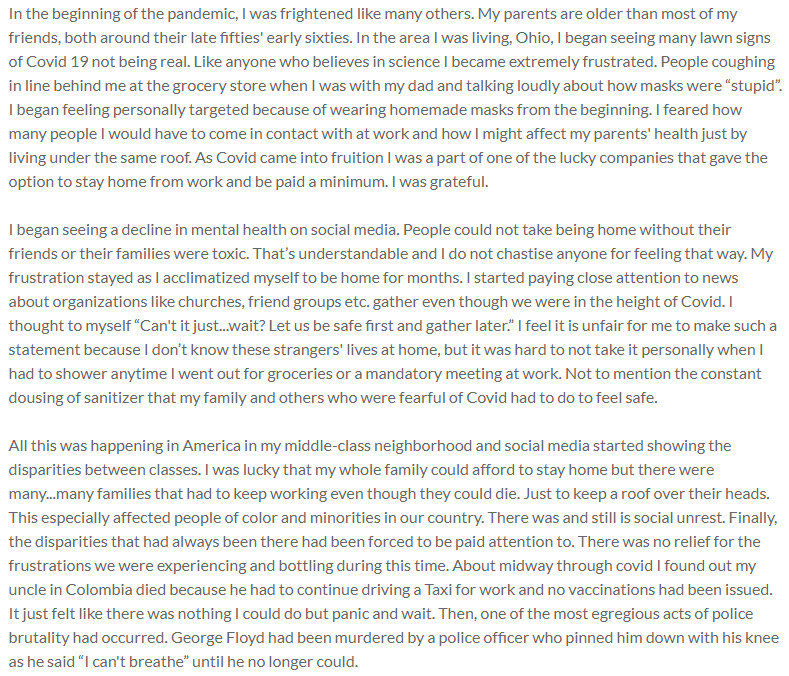 2020-06-01
2020-06-01A privilaged white latina women.
In the beginning of the pandemic, I was frightened like many others. My parents are older than most of my friends, both around their late fifties' early sixties. In the area I was living, Ohio, I began seeing many lawn signs of Covid 19 not being real. Like anyone who believes in science I became extremely frustrated. People coughing in line behind me at the grocery store when I was with my dad and talking loudly about how masks were “stupid”. I began feeling personally targeted because of wearing homemade masks from the beginning. I feared how many people I would have to come in contact with at work and how I might affect my parents' health just by living under the same roof. As Covid came into fruition I was a part of one of the lucky companies that gave the option to stay home from work and be paid a minimum. I was grateful. I began seeing a decline in mental health on social media. People could not take being home without their friends or their families were toxic. That’s understandable and I do not chastise anyone for feeling that way. My frustration stayed as I acclimatized myself to be home for months. I started paying close attention to news about organizations like churches, friend groups etc. gather even though we were in the height of Covid. I thought to myself “Can't it just...wait? Let us be safe first and gather later.” I feel it is unfair for me to make such a statement because I don’t know these strangers' lives at home, but it was hard to not take it personally when I had to shower anytime I went out for groceries or a mandatory meeting at work. Not to mention the constant dousing of sanitizer that my family and others who were fearful of Covid had to do to feel safe. All this was happening in America in my middle-class neighborhood and social media started showing the disparities between classes. I was lucky that my whole family could afford to stay home but there were many...many families that had to keep working even though they could die. Just to keep a roof over their heads. This especially affected people of color and minorities in our country. There was and still is social unrest. Finally, the disparities that had always been there had been forced to be paid attention to. There was no relief for the frustrations we were experiencing and bottling during this time. About midway through covid I found out my uncle in Colombia died because he had to continue driving a Taxi for work and no vaccinations had been issued. It just felt like there was nothing I could do but panic and wait. Then, one of the most egregious acts of police brutality had occurred. George Floyd had been murdered by a police officer who pinned him down with his knee as he said “I can't breathe” until he no longer could. America turned upside down. We saw videos of buildings being destroyed, fires, mass protests, shootings, the worst you could imagen. As a collective we had reached our boiling point and the last straw was this murder. My family was against my brother and I protesting because Covid still being at its height. I have protested at the Womens March in D.C and several pro-choice marches in Ohio but the Black Lives Matter movement was something I needed to educate myself on and stand up for. It was a calling for someone in my position of privilege to show up in numbers for people of color that deserve rights just as the rest of us. I often reflect on how my life could have been so different. My father is Colombian, and my mother is Polish. I look white and have always been raised in a middle-class neighborhood. I have not had to face the same injustices as my father, my family and minority groups in America just based off the color of my skin. Police brutality has always been in existence but when we were all home during Covid with modern day technology and video evidence, we felt that video to the core. We felt the pure rage and frustrations as a society of how we were not being cared for in the way we thought we would have been during this pandemic. I have never witnessed in my lifetime such united support for one another. Such a strong fight against people in power who are coming after the people we call friends, workers, lovers, and family no matter the color of their skin. In such destruction, pain and chaos I had never felt such beauty in our society. I will never forget the feeling of unity around me I had felt as hundreds of people laid down on the hard pavement during the Black lives Matter protest yelling “I cant breathe.” Finally, we could help the unheard be heard and take a deep breath together. -
2022-04-29
The Pandemic in the Military
When I found out about the start of lock downs and the fact that a pandemic was even happening, I was at the end of a training rotation at Fort Irwin, CA. My colleagues and I were extremely concerned about the welfare of our families as we had all been screened for symptoms, but there was talk of us not being able to return home until the DOD had figured out exactly how they were going to respond to the “sudden” emergency. I only put sudden in quotes because the government had plenty of warning that this was coming but decided that it wasn’t worth acting on until it had already started happening. Once home, the adjustment to a new way of life was akin to being dropped in a foreign country that speaks a language you don’t understand and has none of the customs you are familiar with. While families, dependents, and civilians had had warning, albeit minimal, that lock downs were going to be a thing and that masks were now mandatory regardless of where you were going, those who had been away without any media or contact back home, were suddenly thrust into the lifestyle of April, 2020. From that time to now, not only has vaccination and the reality of the virus become a contentious topic among coworkers, friends, and family, but what side of the issue you place yourself on has led to some of the worst division the nation has seen since the 1960s. Families have been ripped apart and friendships destroyed because the views expressed and sides taken on pandemic related issues, including the 2020 election, have adopted the same level of identity in our lives as our ethnic, racial, or religious backgrounds. Those who would have found common ground in shared religious belief, or shared culture now create new divides on the basis of believing that the vaccine works or not or believing that those who participated in the Jan 6, 2021 Capitol incident were justified or not. -
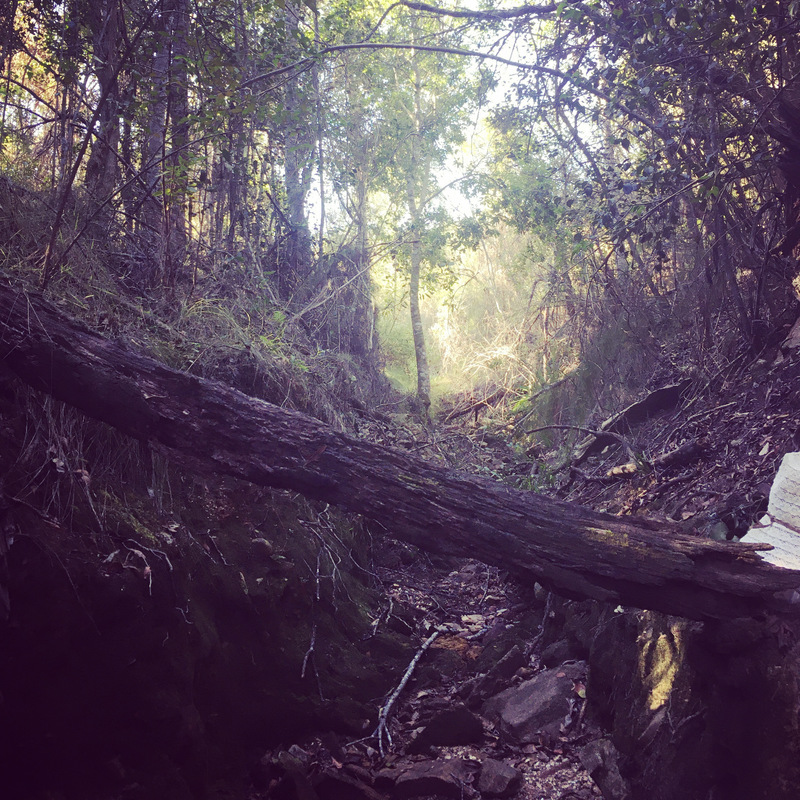 2020-04-26
2020-04-26A World Apart
Nearly a decade ago, I immigrated to South Africa. At the time of the start of the pandemic, my partner and I had been struggling with our visa papers and it had been 7 years of fighting with Home Affairs. March 2020 saw the closure of Home Affairs, a national state of emergency with nearly a year of stay-at-home orders from the government, curfew, and limited access to the public sphere, and for the first time, a reprieve from the nightmares of the immigration process. Just like that, in a single memo to the public, Home Affairs resolved all of its bureaucracy, in favour of public safety, and my partner and I were able to stay in the same place together for over 18 months. The longest we'd been able to stay together since immigrating. In a situation that saw so much upheaval, pain, uncertainty, and widespread panic, I found precious moments of peace and safety. I felt lucky and guilty all at once. Living in a rural forest community in the mountains, with my nearest neighbour over a mile away, stay-at-home orders had little impact on my daily life and I was able to relish time at home with the people who mean the most to me. All the while, stories of social and political dissent and unrest played a continual reminder that not all was right with the world, that my experience was unique and world's apart from the collective pandemic experience. I was made painfully aware that this global phenomenon, one that connected people so thoroughly and completely, was a deeply and fundamentally separate experience for myself. I have a privileged, unique, and unusual story of joy and peace experiencing the pandemic. As an American in another country, I was able to see first hand what a nation with limited resources could do when it decided to put public health and safety above all else. The pandemic provided me with my very first experience of feeling wholly communally supported, safe, and protected. This is a story I want to share because so many people were deeply traumatised by their government's response to covid and the subsequent fallout of the lack of support, and for them to know that it was no failing on their part for feeling like they were put through a meat grinder. Every single person on this planet deserved to experience the ease and simple joy that I was granted, and in a world with such immense wealth, there is honestly no excuse for why my experience was so unique.
